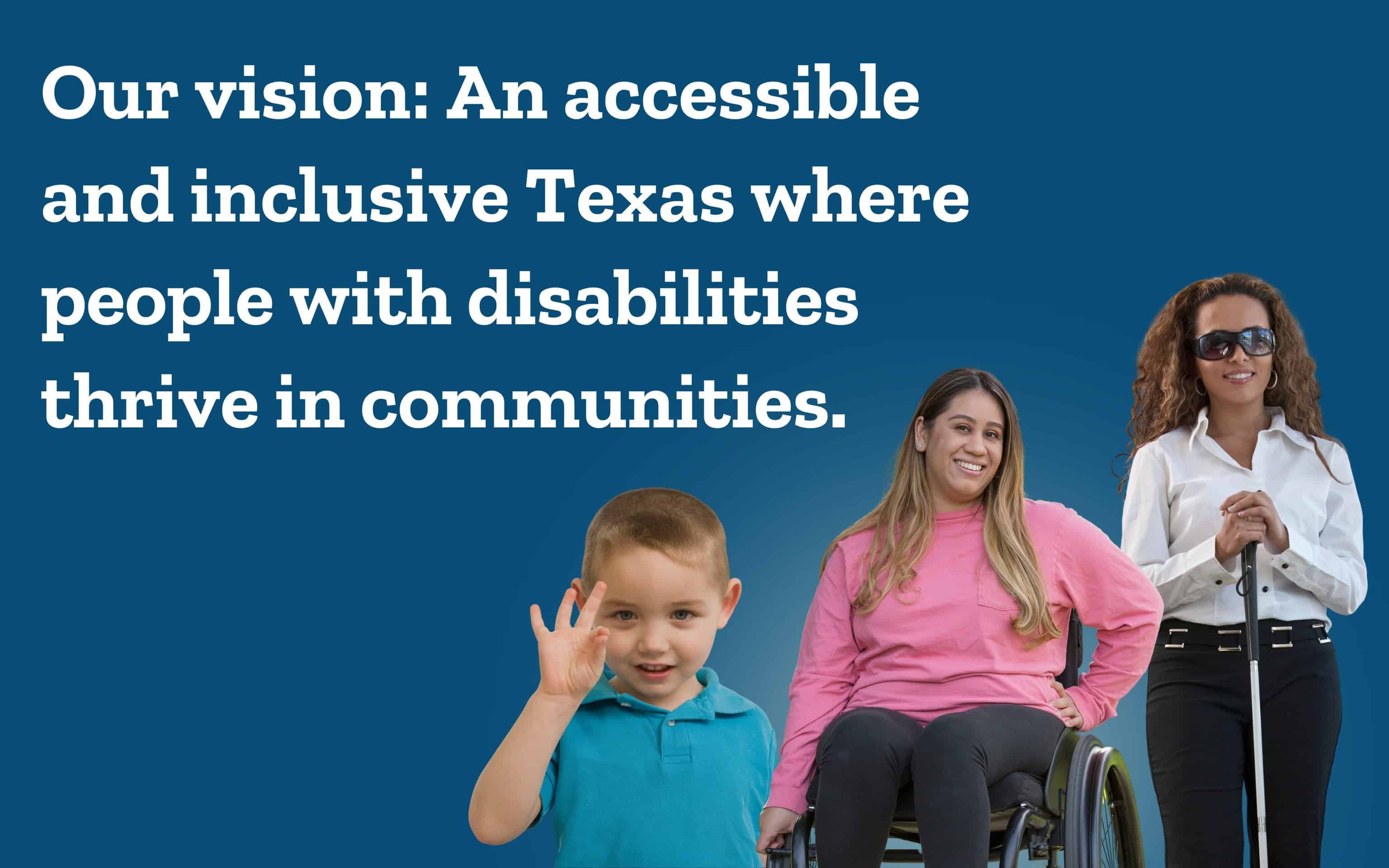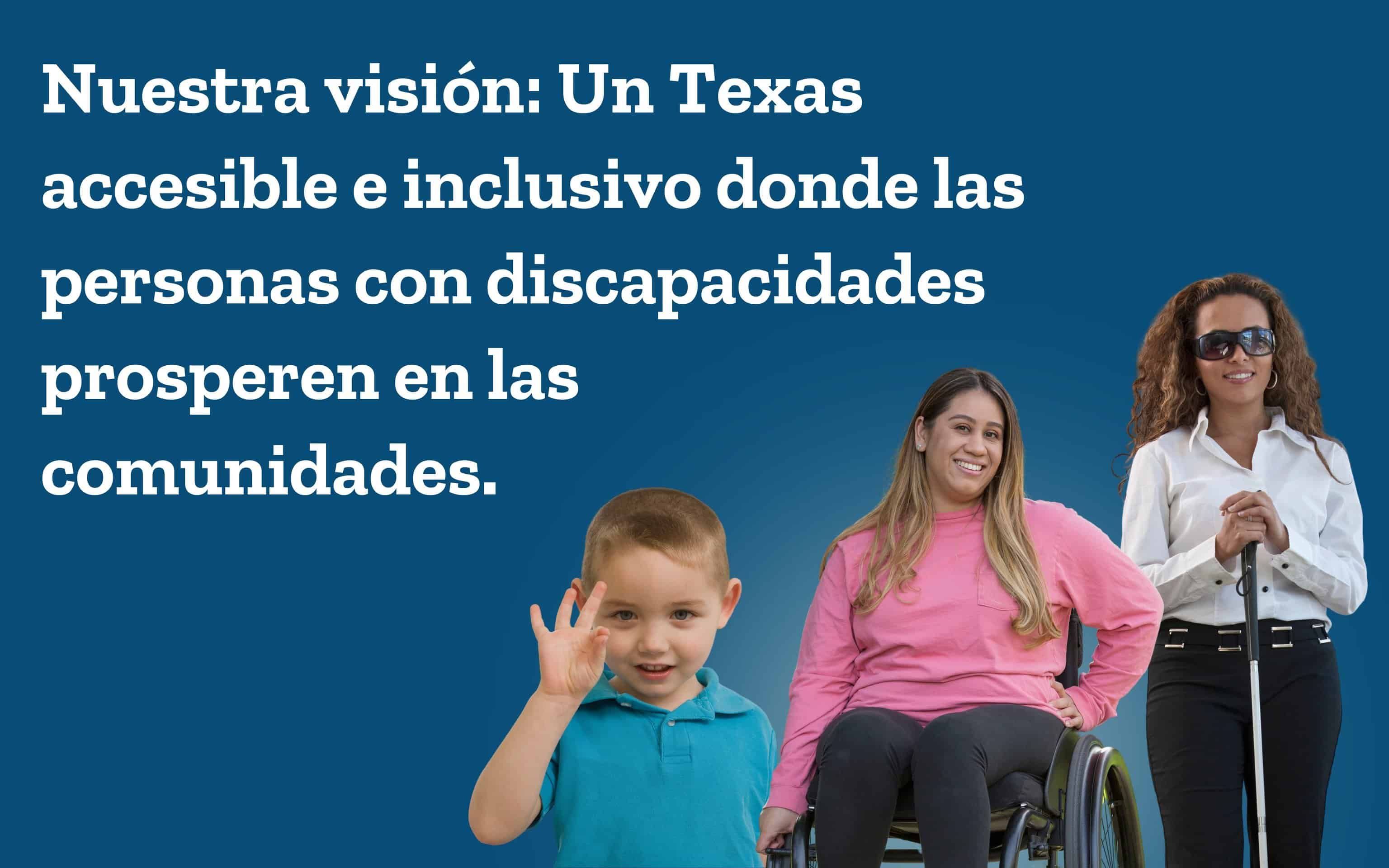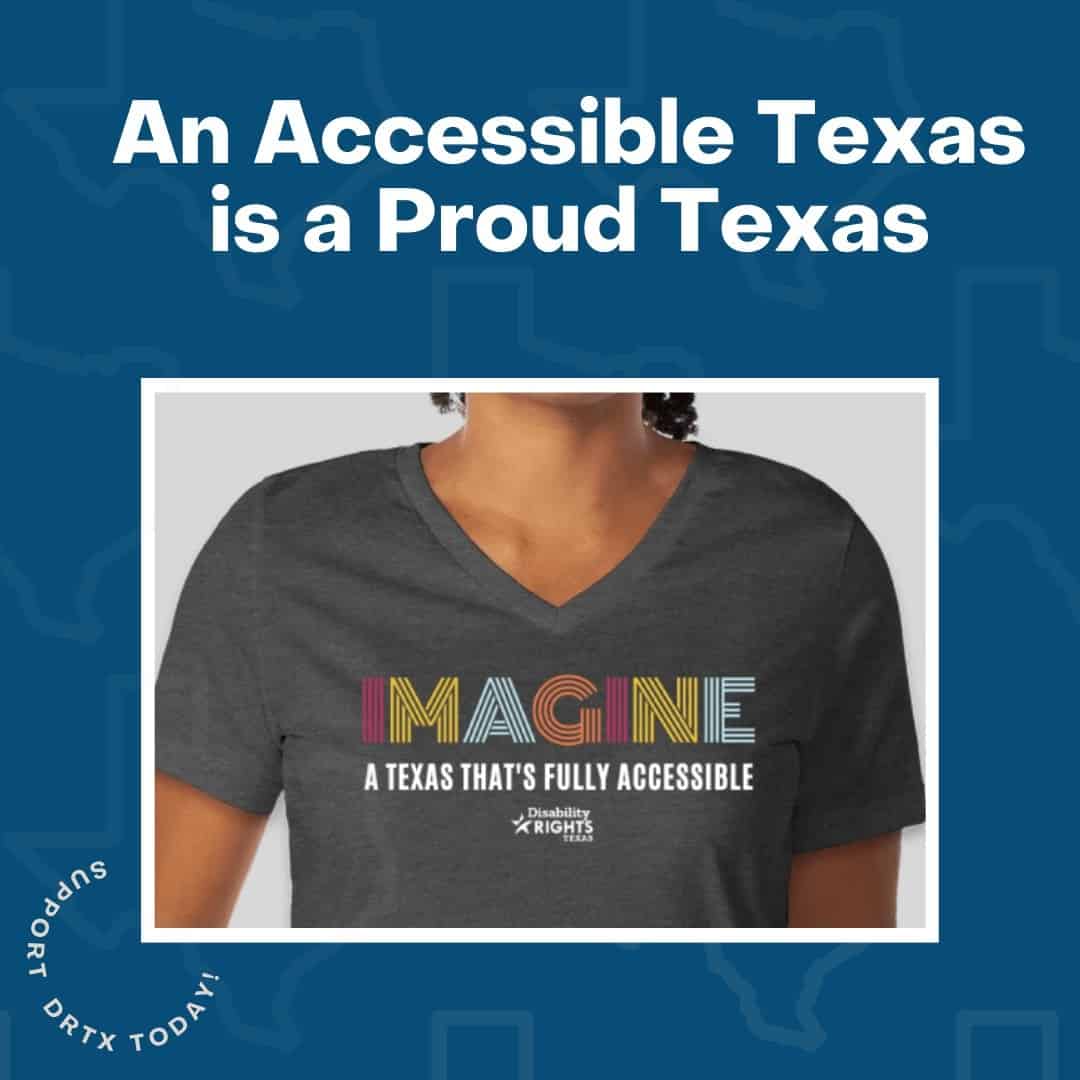



Staff Blog
Earlier this year, Disability Rights Texas (DRTx) conducted the 2023 Disaster Resilience Survey of Texans with Disabilities. We asked respondents how prepared they are for disasters and emergencies, what they’re worried about, and what they need to be more resilient. The survey – which was open to Texans with disabilities, people who support a person with a disability, and others connected to the disability community – received 426 responses.
We learned that the majority of the respondents are not prepared for disasters or emergencies.
How prepared are Texans with disabilities?
While the majority of survey respondents had some of the disaster preparedness basics covered, the majority of respondents said that they were not prepared when it comes to these items that are specific to the disability community:
- 85% don’t have a plan to continue to access healthcare services
- 66% don’t have a plan for evacuating and sheltering in place
- 71% don’t know how to get prescriptions refilled
- 61% are not registered as a critical care customer with their electricity provider
- 70% don’t have an alternate power source to keep medications refrigerated, operate durable medical equipment, or charge a cell phone
- 77% don’t have a back-up for their in-home healthcare if their provider isn’t available
The basic preparedness actions that the majority of respondents had taken included having their important information in one place (55%), being signed up to get local emergency alerts (65%), having enough food and water for five days (64%), and having a first aid kit (73%).
Gaps at the local level
Another preparedness gap the survey revealed was the disconnect between the needs of disability community, their local emergency management department, and equitable outcomes in response and recovery measures.
Local emergency management departments are required to serve all citizens – including people with disabilities – if a disaster or emergency happens. Some people with disabilities may require certain accommodations so they can access the same services as everyone else and stay safe. A significant majority of survey respondents said that they face barriers related to some services that their local emergency management department should provide. Barriers include a service not being provided, not knowing how to access a service that is provided, and not knowing if a service is provided.
Below are the services and the percentage of respondents who indicated experiencing a barrier to accessing that service.
- Places to get food, water, and supplies (79% experienced a barrier)
- Places you can go for shelter (83%)
- Shelters that are accessible (85%)
- Shelters with the healthcare staff, services, and equipment you need (92%)
- Transportation to a shelter (94%)
What worries the disability community?
With Texas being a hotbed for extreme events, the survey also gauged respondents’ level of worry related to naturals disasters and manmade emergencies. The types of events respondents were most worried about are listed below.
- Cybersecurity threats (82% are worried)
- Extreme heat (76%)
- Mass shootings (73%)
- Tornadoes (67%)
- Cold weather events (66%)
- Public health emergency (66%)
The three types of events that survey respondents were the least worried about were earthquakes (18%), wildfires (41%), and hurricanes (44%).
Striving towards a more resilient Texas
Being prepared for disasters and emergencies is everyone’s responsibility. Individuals with disabilities need to take responsibility for their own preparedness. Public entities need to ensure that the resources and services they provide are accessible for people with disabilities.
Since the survey, DRTx has published a number of Disaster Resilience resources that people with disabilities can use to improve their level of preparedness. Some of the resources directly address topics that came up in the survey, like cybersecurity, healthcare during a disaster, and extreme heat. We also launched a monthly Disaster Resilience newsletter, delivering preparedness information directly to people’s inboxes.
DRTx is also having a presence at various disability- and preparedness-related events around the state. At these events, we’re sharing important information to help people be more prepared for the next disaster or emergency.
In 2024, we’ll conduct another disaster resilience survey, and we’ll also use the feedback from that survey to identify – and address – the preparedness needs of Texans with disabilities.




Staff Blog
Self-advocacy is when you use your voice to let others – especially decision makers – know what’s important to you. When you self-advocate, you work to influence decisions that will affect your life, instead of having other people make decisions without your input.
1. Prioritize Your Goals
What are your self-advocacy goals? Your answers to this question will help you decide your next steps.
2. Know Your Rights
It is your right to understand the laws that determine your rights. You also have the right to receive information in your primary language and in alternative formats.
3. Keep Records
It is vital that you keep accurate records. Be sure to keep important documents in one safe place.
4. Prepare and Plan
Before a meeting, reflect on your goals, review your documents, and talk with people you trust to help you prepare.
5. Be Creative and Assertive
Make sure you keep your discussion short and to the point. Share when you disagree and collaborate to find the best solution for you.
6. Get Decisions in Writing
Keep track of your progress through documentation. If you disagree with a decision, ask for it in writing.
7. Right to Appeal
If you do not get a decision that you agree with, you have the right to challenge it.
8. Interim Solutions
While you wait for a decision to be made on your case, consider other options by exploring what resources are available to help you in the meantime.
9. Review Documents
Review all agreements and action items to ensure
everyone involved is on the same page, and sign only what you agree to.
10. Follow Up
Stay on top of any final deadlines and communications. Remember to thank those who have helped you in this process.
For more information about these tips, see our 10 Self-Advocacy Tips handout.
This information is based on Disability Rights Florida’s 10 Steps to Effective Self-Advocacy.




Staff Blog
It isn’t a question of if, but when.
The reality of the world we live in is that an event – whether natural, man-made, or a public health emergency (like the COVID-19 pandemic) – will happen. And the event doesn’t care if you are ready or not, so everyone must play a role in their own preparedness.
September is National Preparedness Month, a good time to create your own disaster preparedness plan so you’re prepared for any type of disaster or emergency.
Being ready to self-advocate – standing up for your rights and needs – is an important part of taking responsibility for your disaster resiliency. Resiliency means being able to get past a hard time more readily. At the end of the day, when a disaster or emergency strikes, you want to determine your fate as much as you can. This way, you’re better informed and aware, and you leave less things to chance.
One way to include self-advocacy in your planning is to talk with people and organizations that could impact you if there’s a disaster or emergency. This could be your local emergency management department, your healthcare provider, a local nonprofit, etc. When you connect, you can be better informed on what services may or may not be provided and this can help you identify the resources you need to better prepared.
Another way to include self-advocacy in your disaster preparedness planning is to know your rights. Learn about your rights related to housing, employment, education, and so on. When you know your rights ahead of time, you’ll already know what you can advocate for when there’s a disaster or emergency.
For more information to help you take responsibility for your preparedness and to understand your rights, see our resource, Self-Advocacy and Being Disaster Ready.
Last updated: August 16, 2024




Staff Blog
Our recent Back to School Newsletter provides highlights of a few significant special education related bills that passed this year. Here are a few more details on those laws plus information on a new resource we have explaining many other new laws.
New laws that impact our kids
Many education-related bills that impact students with disabilities passed in this year’s state legislative session. Our new resource, Overview of Texas Special Education Bills Passed in 2023, lists several of these new laws. Here are a few highlights from that resource:
- House Bill 3928 improves special education services for students with Dyslexia and related disorders. Some of the bill’s provisions include clarification on how students with Dyslexia qualify for special education services, a requirement to update the state’s Dyslexia Handbook, and that providers of Dyslexia interventions must be appropriately trained. These are just a few of the many requirements in this new law.
- Senate Bill 133 limits law enforcement and school security personnel in the use of physical force and restraint techniques on elementary students. We started the session with a press conference at the Capitol calling on legislators to stop the violence experienced by many Texas students when being restrained. This bill is a start. It applies to students in 5th grade or below and prohibits use of a Taser, chemical irritant spray, handcuffs, and physical restraint.
- A major provision of recently passed House Bill 473 adds to legislation passed in 2019 that created school threat assessment teams. Now those teams must involve the parents of the student being assessed.
- House Bill 3 addresses physical security and safety of public schools and includes several requirements such as new guidance on emergency plans for students with disabilities; district employees being trained in mental health first aid; and TEA monitoring districts on school safety and establishing an Office of School Safety and Security. Read our resource to learn about other provisions in this new law.
These laws become effective for the 2023-2024 school year. For more on these and other bills that passed, see our new resource, Overview of Special Ed Laws Passed in 2023.
Resources for a successful school year
Don’t forget that we have several education resources to help you know your rights so you can advocate for what your student needs this year.
- IDEA Manual: A Comprehensive Guide on Special Education in Texas
- Requesting an Initial Evaluation
- How to File a TEA Complaint
- Request a Camera in Your Child’s Classroom
- Dealing with Incident Reports and Requesting Video Recordings
- Interactive Discipline Guide
For news and updates throughout the year, join our Facebook group, Keeping Tabs on TEA and State Related Special Ed Issues, and subscribe to our new Special Education News & Resources email list.




Staff Blog
If there’s a disaster or emergency, planning for your healthcare needs – which includes specialized medical services, attendant services, and mental health supports – could help you stay as independent as possible during a potentially chaotic time.
Provider services
Whether you receive healthcare services in the community or in a group setting, you should continue to have access to services when a disaster strikes. Be proactive and ask your provider about their disaster or emergency plan so you know what to expect when a disaster occurs.
Medications
If a disaster or emergency turns your life upside down, you still want to have access to your medications – no matter where you end up. Make sure you have enough medications and keep your medications safe. Also, learn how you can refill a prescription if you run out of one during a disaster.
Mental health care
Your mental and behavioral health could be impacted by the trauma and uncertainty associated with a disaster and recognizing your personal needs is critical to your recovery and overall well-being. Learn about the potential mental and behavioral health resources and supports that could help you recover from a disaster.
Additional information
For a deeper dive on each of these topics, see the resources listed below.




Staff Blog
By now most people know that the ADA (Americans with Disabilities Act) is a ground-breaking law that protects the rights of those with disabilities and enables them to be fully included in American life. As we celebrate the 33rd anniversary of the passage of this legislation, we did some research and found out a few things about the ADA that we bet you didn’t know:
- President George H.W. Bush signed the ADA with 59 pens, each of which were later given to key figures involved in the advocacy for disability rights.
- Since 2000, 181 countries have have passed disability civil rights laws inspired by the ADA.
- More than half of accommodations for people with disabilities under the ADA cost employers NOTHING. The average for other accommodations is about $500.
- The ADA also applies to digital accessibility, not just physical. In fact, the number of web accessibility lawsuits that were brought to federal court citing Title III of the ADA reached a new record in 2022, with plaintiffs filing 3,255 lawsuits—a 12 percent increase from 2021.
- Family members and others that have a relationship with a disabled person cannot be discriminated against by an employer or potential employer for that association. For example, an employer cannot refuse to hire an individual who has a child with a disability based on an assumption that the applicant will be away from work excessively or be otherwise unreliable. (Learn more about the ADA’s Association Provision.)
Join us in celebrating the ADA anniversary by purchasing one of our Imagine t-shirts. Proceeds from sales support our work to create a more accessible Lone Star State. (Sales end July 30, 2023.)




Staff Blog
Knowing your rights and then learning how to effectively advocate for yourself are extremely important skills for people with disabilties to have. That’s why we are excited to announce a new 3-part video series, How to Be Your Own Best Advocate.
These videos and accompanying resources were created in partnership with DRTx Self-Advocate Intern Larissa Minner of the University of Texas ACT-LEND Practicum Program and is based on her research, and her professional and personal experience.
Video 1 covers:
- Defining self-advocacy
- Tips for problem solving
- How to be assertive vs. aggressive
Video 2 explains:
- What partial disclosure is
- Why and how to use self-disclosure
Video 3 discusses:
- Facing external obstacles such as people’s attitudes toward your disability
- Dealing with your own self-talk and internal struggles
Accompanying handouts are available linked below.
Our thanks to Larissa for her great work on this important project.




Staff Blog
This month we celebrate the 33rd anniversary of one of the most important pieces of legislation in our nation’s history – the Americans with Disabilities Act (ADA). Passed in 1990, this civil rights law prohibits discrimination against individuals with disabilities in all areas of public life, including jobs, schools, transportation, and all public and private places that are open to the general public.
The law’s purpose is to ensure that people with disabilities have the same rights and opportunities as everyone else. The ADA gives civil rights protections to individuals with disabilities similar to those provided to individuals on the basis of race, color, sex, national origin, age, and religion. It guarantees equal opportunity for individuals with disabilities in public accommodations, employment, transportation, state and local government services, and telecommunications. The law was amended in 2008 to making a number of significant changes to the definition of “disability.”
 Though we’ve seen many changes over the years in making our nation more accessible, Texas still has some work to do. Disability Rights Texas remains dedicated to creating a Lone Star State where people with disabilities can live and thrive in our communities.
Though we’ve seen many changes over the years in making our nation more accessible, Texas still has some work to do. Disability Rights Texas remains dedicated to creating a Lone Star State where people with disabilities can live and thrive in our communities.
You can celebrate the ADA this year and support our work by purchasing one of our “Imagine” t-shirts. Spread a message of inclusion while supporting our work to make Texas fully accessible. And buy a few extra for family and friends!
Thank you for your continued support of our work.




Staff Blog
Summer is here, and that’s not always a good thing.
Texas is hot, and it’s going to get hotter. As temperatures rise and we see more extreme heat and wildfires, more people with disabilities and service animals may face dangerous – even life-threatening – conditions.
With recent temperatures already exceeding 100° across many parts of the state, the time to prepare is now. Below are some things you can do to stay safe.
- Know what’s up: watch the weather so you know when extreme heat is coming and make sure you understand the different heat-related warnings.
- Stay cool: before the heat arrives, prepare your home to keep the hot air out and the cool air in. And know where your local cooling centers are if you have to leave.
- Signs of illness: understand heat-related illness so you know what symptoms to look for and what to do.
- Wildfires: take proactive steps to protect your home from wildfires and create your own wildfire action plan.
For more information about these tips and others, see our new resource:




Staff Blog
Hurricanes can cause all types of problems that turn your life upside down. They can disrupt access to things like food and water, power, cell phone service, and more. It’s important to be prepared so you can deal with whatever a hurricane throws at you.
Hurricane season officially started June 1. Whether you’re a preparedness newbie or someone who has prepared in the past, take this opportunity to make sure you’re as ready as possible. Get started by reading – and thinking about – the questions below.
- Food and water: do you have enough food and water on hand, and do you know where it will be distributed?
- Transportation: if you leave your home, do you have access to reliable transportation?
- Housing: is there a place you can go if you have to leave your home?
- Power: do you have a backup power source in the event there’s a long power outage?
- Healthcare: do you have a plan for accessing medical care during and after a hurricane?
- Get help: do you know what resources will be available to help you recover from a hurricane?
For more information about the questions listed above and more, see our new hurricane preparedness guide:




